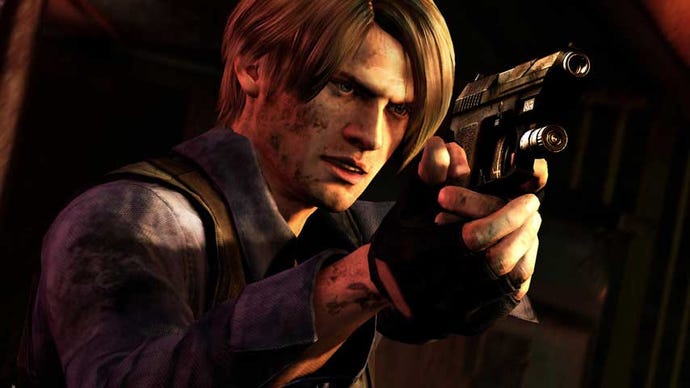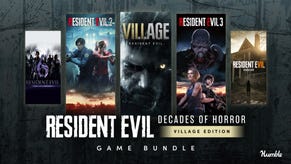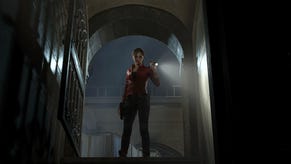Resident Evil 7: Capcom doesn't want to repeat series mistakes, but what else can it do?
Resident Evil 7 has popped its (mutated, glaring) head around the corner, and suddenly we're back on the same old emotional roller coaster. How can Capcom avoid another Resident Evil 6 disaster?
Resident Evil 7 is on the horizon. It's only a rumour at this stage, but it's a believable one - especially as we kind of expected it last year, and there have been other little hints in the interim.
If it feels like only yesterday we got Resident Evil 6, that's because it kind of is. Remember the good old days when Capcom would produce multiple editions and re-releases and spin-offs of every Resident Evil game, squeezing every last drop of cash out of the formula and canon before moving onto the next update? We used to complain about that, of course, because that's pretty much our function in life as near as I can make out, but the market supported it because the core product was so good.
Resident Evil 6, not so much.
Now, every Resident Evil fan has a theory about where the series peaked. Personally, I'm all about Resident Evil 2, but there are others just as passionate about Resident Evil 3, and a huge contingent in favour of the original. Resident Evil 4 is near-universally acknowledged as a highlight; it was a game-changer for many players. Even Resident Evil 5 has plenty of fans, despite a feeling amongst one half of the fan base that it got a bit too shooty.
Do you remember when Capcom announced Resident Evil 6? Going back to a Racoon City-like setting. Revisiting beloved characters. Tying up dangling plot lines (although the image of the Resident Evil canon as anything as cohesive as a loose pile of half-coiled lines gives far too much credit to a series of creators who have made it all up, willy-nilly, as they went along). Balancing the popular control system of Resident Evil 4 and its successors (characters do not steer like tanks!) with the tense, tight horror of early survival horror. We were desperately excited.
Well, actually, I say "we" but I wasn't. Capcom talked a good talk but it wasn't walking the walk, and it is only because my heart bled with sympathy after Resident Evil 6 released that I didn't write an op-ed along the lines of "I told you so, didn't I? What'd you go and pre-order that for, you mumpties".
Still: despite its vocal detractors among hardcore series fans, Resident Evil 6 is pretty popular, and sold 5.6 million units. I don't like it and there's a 50% chance you don't like it, but there it is: someone is going to come along and comment about how much they liked it and how I should get back in the kitchen if I don't mention it.
Capcom wasn't happy with it, though. Even putting aside the fact that 5.6 million sales isn't enough for the lumbering laborious beast that is the modern Japanese mega-publisher (gods/Miyamoto save us all), Resident Evil 6 was not a success. Sales are one thing but reception is another, and while publishers may not necessarily care about Metacritic (except where it pertains to not paying bonuses to developers, hola) they do care about the kind of stinking PR shitstorm that arises when series fans express their disappointment. Resident Evil 6 is widely perceived as a dud or flop, in spite of its reasonable sales and cabal of happy fans, and that's not good for anyone.
The best way to fix this, for all concerned, is to make a good Resident Evil game. Seems simple, right?
While “put it back the way it was” is a familiar cry in these parts, we must bear in mind the inexorable march of progress. Things that worked really well when we only had six polygons on screen don’t translate to the HD era.
The problem is what constitutes a good Resident Evil game isn't as easy to pin down as you'd expect, which is why Capcom, for all its market research, testing, and massive resources, has managed to faff it up.
If you ask me, I'd say taking away the focus on shooter action and making resources so scarce that combat becomes an emergency escape route when you get lost or panic would go a long way. Returning to labyrinthine environments with lock-and-key setups designed by an increasingly unstable series of interior designers would go a long way, too.
For many players, though, the laborious wandering back and forth figuring out which rooster key goes in which chicken door, and having to run away from combat, doesn't fit their idea of what a video game should be. The power fantasy has gone. If you started the series with Resident Evil 4 or later and loved it, going back to the dated graphics, painfully clunky controls and frankly bizarre level design of the originals must feel like pashing one of your ancestors whose been dead for a couple of centuries: dry, uncomfortable and gross on several levels at once.
While "put it back the way it was" is a familiar cry in these parts, we must bear in mind the inexorable march of progress. Things that worked really well when we only had six polygons on screen don't translate to the HD era, and the audience is so much larger now, and so vocally keen on whatever the zeitgeist is (Call of Duty, let's face it) that some elements of the new school just have to creep in. If Capcom did put it back the way it was, we'd probably complain twice as loudly, because we are not who we were in 1998. I have better hair, for one thing.
So what does Capcom need to do to make sure Resident Evil 7 doesn't acquire the same poor reputation (deserved or not) of Resident Evil 6? I personally feel there is room for traditional survival horror with whizz bang graphics, but I'd love to hear your thoughts. What to keep, what to bring back, what to set on fire and never speak of again? Who knows, maybe Capcom wants to hear too.
Rumour has it Resident Evil 7 will be shown at E3 2014, and may be a PlayStation 4 or Xbox One exclusive.









